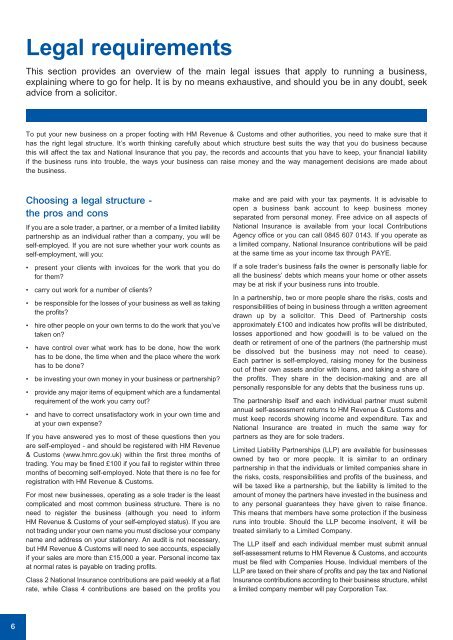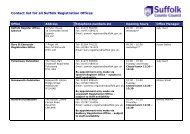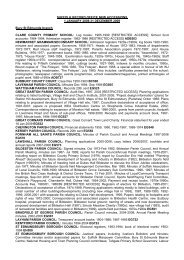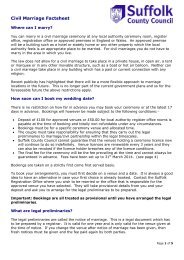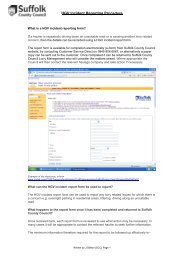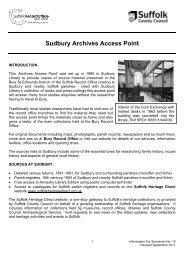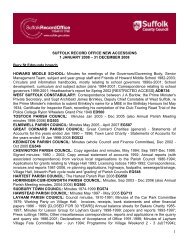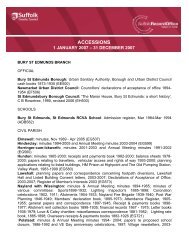starting and growing small business suffolk 06 12 11
starting and growing small business suffolk 06 12 11
starting and growing small business suffolk 06 12 11
- No tags were found...
You also want an ePaper? Increase the reach of your titles
YUMPU automatically turns print PDFs into web optimized ePapers that Google loves.
Legal requirementsThis section provides an overview of the main legal issues that apply to running a <strong>business</strong>,explaining where to go for help. It is by no means exhaustive, <strong>and</strong> should you be in any doubt, seekadvice from a solicitor.To put your new <strong>business</strong> on a proper footing with HM Revenue & Customs <strong>and</strong> other authorities, you need to make sure that ithas the right legal structure. It’s worth thinking carefully about which structure best suits the way that you do <strong>business</strong> becausethis will affect the tax <strong>and</strong> National Insurance that you pay, the records <strong>and</strong> accounts that you have to keep, your financial liabilityif the <strong>business</strong> runs into trouble, the ways your <strong>business</strong> can raise money <strong>and</strong> the way management decisions are made aboutthe <strong>business</strong>.Choosing a legal structure -the pros <strong>and</strong> consIf you are a sole trader, a partner, or a member of a limited liabilitypartnership as an individual rather than a company, you will beself-employed. If you are not sure whether your work counts asself-employment, will you:• present your clients with invoices for the work that you dofor them?• carry out work for a number of clients?• be responsible for the losses of your <strong>business</strong> as well as takingthe profits?• hire other people on your own terms to do the work that you’vetaken on?• have control over what work has to be done, how the workhas to be done, the time when <strong>and</strong> the place where the workhas to be done?• be investing your own money in your <strong>business</strong> or partnership?• provide any major items of equipment which are a fundamentalrequirement of the work you carry out?• <strong>and</strong> have to correct unsatisfactory work in your own time <strong>and</strong>at your own expense?If you have answered yes to most of these questions then youare self-employed - <strong>and</strong> should be registered with HM Revenue& Customs (www.hmrc.gov.uk) within the first three months oftrading. You may be fined £100 if you fail to register within threemonths of becoming self-employed. Note that there is no fee forregistration with HM Revenue & Customs.For most new <strong>business</strong>es, operating as a sole trader is the leastcomplicated <strong>and</strong> most common <strong>business</strong> structure. There is noneed to register the <strong>business</strong> (although you need to informHM Revenue & Customs of your self-employed status). If you arenot trading under your own name you must disclose your companyname <strong>and</strong> address on your stationery. An audit is not necessary,but HM Revenue & Customs will need to see accounts, especiallyif your sales are more than £15,000 a year. Personal income taxat normal rates is payable on trading profits.Class 2 National Insurance contributions are paid weekly at a flatrate, while Class 4 contributions are based on the profits youmake <strong>and</strong> are paid with your tax payments. It is advisable toopen a <strong>business</strong> bank account to keep <strong>business</strong> moneyseparated from personal money. Free advice on all aspects ofNational Insurance is available from your local ContributionsAgency office or you can call 0845 607 0143. If you operate asa limited company, National Insurance contributions will be paidat the same time as your income tax through PAYE.If a sole trader’s <strong>business</strong> fails the owner is personally liable forall the <strong>business</strong>’ debts which means your home or other assetsmay be at risk if your <strong>business</strong> runs into trouble.In a partnership, two or more people share the risks, costs <strong>and</strong>responsibilities of being in <strong>business</strong> through a written agreementdrawn up by a solicitor. This Deed of Partnership costsapproximately £100 <strong>and</strong> indicates how profits will be distributed,losses apportioned <strong>and</strong> how goodwill is to be valued on thedeath or retirement of one of the partners (the partnership mustbe dissolved but the <strong>business</strong> may not need to cease).Each partner is self-employed, raising money for the <strong>business</strong>out of their own assets <strong>and</strong>/or with loans, <strong>and</strong> taking a share ofthe profits. They share in the decision-making <strong>and</strong> are allpersonally responsible for any debts that the <strong>business</strong> runs up.The partnership itself <strong>and</strong> each individual partner must submitannual self-assessment returns to HM Revenue & Customs <strong>and</strong>must keep records showing income <strong>and</strong> expenditure. Tax <strong>and</strong>National Insurance are treated in much the same way forpartners as they are for sole traders.Limited Liability Partnerships (LLP) are available for <strong>business</strong>esowned by two or more people. It is similar to an ordinarypartnership in that the individuals or limited companies share inthe risks, costs, responsibilities <strong>and</strong> profits of the <strong>business</strong>, <strong>and</strong>will be taxed like a partnership, but the liability is limited to theamount of money the partners have invested in the <strong>business</strong> <strong>and</strong>to any personal guarantees they have given to raise finance.This means that members have some protection if the <strong>business</strong>runs into trouble. Should the LLP become insolvent, it will betreated similarly to a Limited Company.The LLP itself <strong>and</strong> each individual member must submit annualself-assessment returns to HM Revenue & Customs, <strong>and</strong> accountsmust be filed with Companies House. Individual members of theLLP are taxed on their share of profits <strong>and</strong> pay the tax <strong>and</strong> NationalInsurance contributions according to their <strong>business</strong> structure, whilsta limited company member will pay Corporation Tax.6


